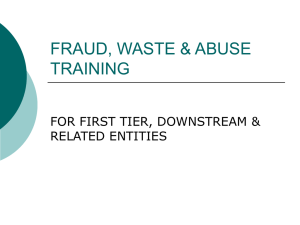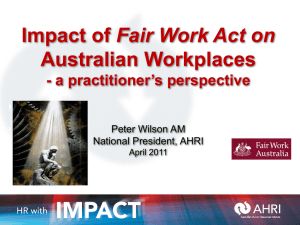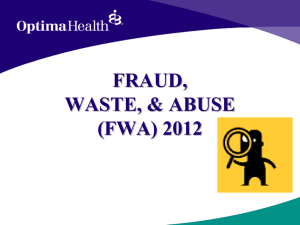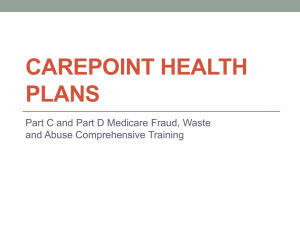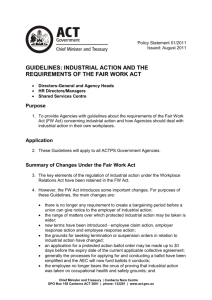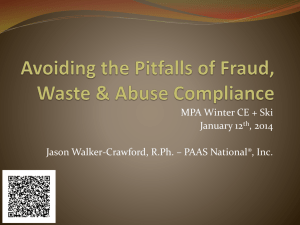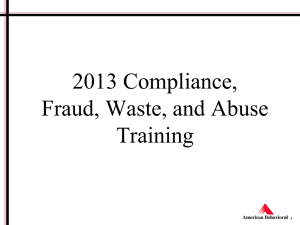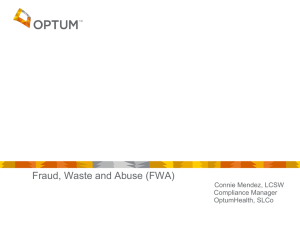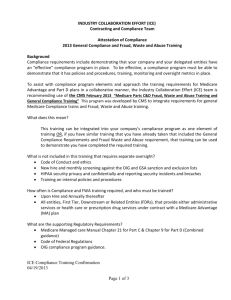(FWA) Prevention Protocol - Central Florida Cares Health System
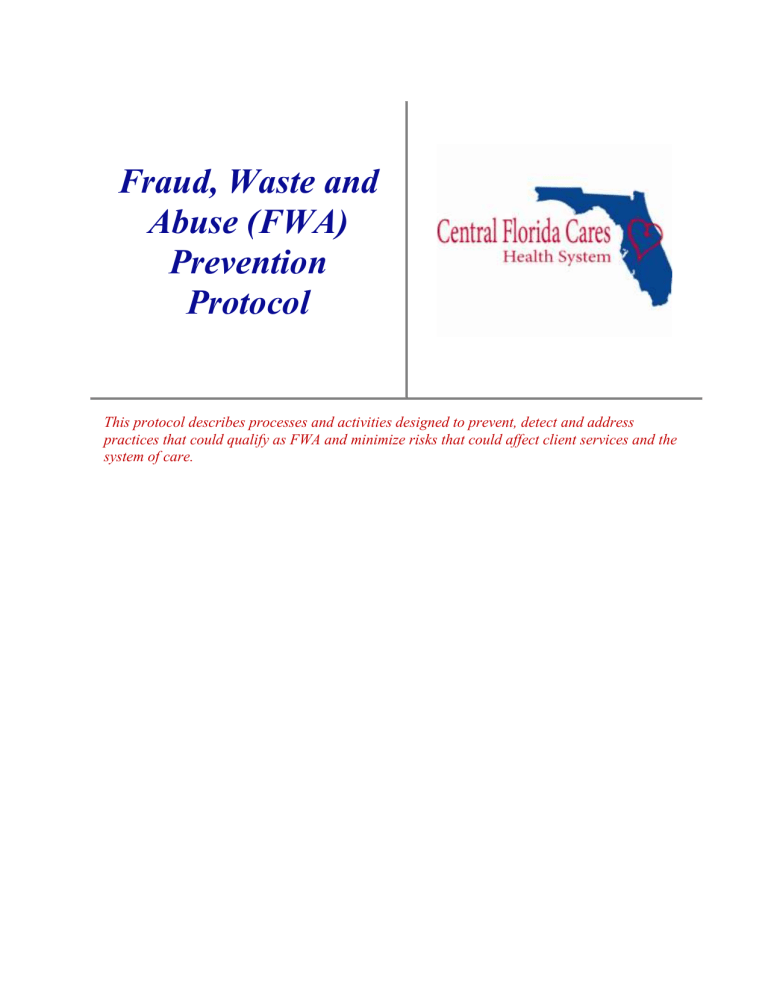
Fraud, Waste and
Abuse (FWA)
Prevention
Protocol
This protocol describes processes and activities designed to prevent, detect and address practices that could qualify as FWA and minimize risks that could affect client services and the system of care.
Table of Contents
Table 2: FWA Contact Information for Oversight and Regulatory Agencies ...................... 19
Table 3: Documents Incorporated by Reference and Other Resources Links ...................... 22
I.
Introduction
It is the policy of Central Florida Cares Health System (CFCHS), Inc. to review and investigate all allegations of Fraud, Waste and Abuse (FWA), to take corrective action for any supported allegations, and to report confirmed misconduct to the appropriate parties. Policies and procedures are in place to ensure that employees, subcontractors, and Board of Directors (where applicable) comply with federal, state, CFCHS and Department of Children and Families (DCF) contract requirements. The intent of this protocol is to reasonably demonstrate how CFCHS complies with these varying requirements, the activities developed to prevent and detect any practices that could qualify as FWA, and minimize risks that could affect client care and the system of care.
This protocol articulates CFCHS’ commitment to:
1.
Promote a culture of integrity;
2.
Establish and maintain a fraud, waste and abuse protocol to investigate possible acts of fraud, waste, abuse or overpayment;
3.
Maintain policies and procedures designed to prevent and detect potential or suspected fraud, waste and abuse in the administration and delivery of services;
4.
Maintain policies and procedures that address investigations, corrective action(s) and follow up activities in instances of suspected and identified fraud, waste, abuse or overpayment;
5.
Work with our business partners, subcontractors and employees to ensure compliance with agency standards of ethical practice as well as regulatory requirements applicable to all operations;
6.
Conduct FWA awareness and compliance training;
7.
Provide information regarding FWA reporting mechanisms available to all stakeholders;
8.
Cooperate fully with any DCF and any other pertinent Government Entity investigation;
9.
Investigate all allegations of FWA;
10.
Respond within reasonable timeframes to detected offenses; and
11.
Report detected offenses to pertinent Government Authorities.
This FWA Prevention Protocol is reviewed by CFCHS employees, and Board of Directors’
Committees. It may be modified or expanded as federal and state laws, contractual requirements and FWA trends change.
CFCHS Fraud, Waste And Abuse (FWA) Prevention Protocol
Revised 8/31/15
Page 1
II.
Protocol Components
A. Policies and Procedures, Manuals and Operational Plans
CFCHS has policies and procedures, handbooks and operational plans that provide the framework to reasonably address the prevention, detection and follow up action related to FWA.
CFCHS website also includes information on FWA, such as reporting mechanisms, and information regarding the consequences of wasteful, abusive or fraudulent use of health care services.
The diagram below outlines policies and plans included in this protocol such as training, monitoring and regulatory requirements. Policies are listed under a specific department, to identify the department as owner of the policies. All employees are expected to be familiar with all CFCHS policies. Implementation of the provisions of these policies is one of the standards by which the performance of employees is measured.
Fiscal Data System of Care
•Accounting &
Financial Policies and Procedures
Manual
•Employee
Handbook
•Codes of Ethics and Conduct
•Human
Resources
•Applicability
•Electronic Mail
•Handling Sensitive
Electronic
Information
•Workstation
Security
•Data Security
•Recipient Eligibility
•Consumer
Handbook
•Network
Management Plan
Compliance
•Consumer
Complaints and
Grievances
•Subcontractor and
Vendor HIPAA
Compliance
•Network Incident
Reporting to DCF
•Internal Incident
Reporting
•CQI Plan
Operations
•Funding Source
Guide
•Federal, State, and
DCF Requirements
•Contract Review
•Payer of Last Resort
•Network
Subcontract
•Subcontractor
Dispute Resolution
•Subcontractor
Monitoring
•Subcontractor
Performance
Improvement Plan
Requests
•Records Retention
•Public Records
Requests
•Procurement
Policy
CFCHS Fraud, Waste And Abuse (FWA) Prevention Protocol
Revised 8/31/15
Page 2
In the event a conflict develops with this FWA Prevention Protocol, the order of interpretation is as follows: a.
Laws and regulations, b.
CFCHS/DCF Contract, c.
CFCHS Policies, Procedures, and Plans
B. Compliance Officer and Committees 1
CFCHS has designated the Risk Manager (RM) as the Compliance Officer (CO).
Geovanna Dominguez, RM/CO can be reached by employees, subcontractors and clients in any of the following ways:
Telephone: 407-985-3568; Florida Relay dial 7-1-1
Compliance Electronic Mail Box: Compliance@cfchs.org
Website form submission:
Mail: http://centralfloridacares.org
Central Florida Cares Health System, Inc.
ATTENTION: COMPLIANCE
707 Mendham Blvd., Suite 104
Orlando, Florida 32825
The Compliance Officer reports to the Chief Operations Officer (COO) and also has access to the Board of Directors. This serves as an integrity safeguard to prevent situations in which the
CEO may not keep the Board of Directors informed of compliance issues brought to the CEO’s attention. The CO coordinates the following program integrity activities:
1.
Develops and implements the compliance program;
2.
Evaluates the compliance program against benchmarks and goals;
3.
Implements and regularly evaluates internal and external audit plans;
4.
Reviews and updates policies, procedures and work plans with department managers and the compliance committee;
5.
Coordinates monthly and ad hoc compliance committee meetings;
6.
Updates to the CEO, COO, Quality Oversight Committee, and Board of Directors regarding compliance, ethics risks, audits and investigations;
7.
Review and update of compliance training programs;
8.
Facilitate review of policies and procedures, and promotes compliance with regulatory standards;
9.
Maintains open lines of communication at all internal and external operational levels (i.e., clients, employees, subcontractors, stakeholders);
10.
Coordinates day-to-day compliance and anti-FWA activities;
11.
Monitors Compliance Hotline;
12.
Investigates and responds to alleged internal and external FWA;
13.
Develops and implements corrective action initiatives; and
1
CFCHS Fraud, Waste And Abuse (FWA) Prevention Protocol
Revised 8/31/15
Page 3
14.
Coordinates response and referrals to regulatory agencies as necessary.
Specific to FWA, the CFCHS Internal Compliance Committee is responsible for:
1.
Reviewing new regulations affecting compliance issues and revising strategies accordingly;
2.
Developing, implementing and evaluating the CFCHS FWA Prevention Protocol;
3.
Staying abreast of current FWA trends and ensuring that this information is disseminated internally across all departments and externally across all network subcontractors;
4.
Reviewing new and ongoing compliance issues, including corrective action plans;
5.
Reviewing and investigating FWA related complaints and grievances;
6.
Identifying potential FWA trends that may put CFCHS, its subcontractors, clients, DCF and stakeholders at risk and developing strategies to prevent and deter such trends;
7.
Proposing contractual language to comply with applicable regulations;
8.
Reviewing quality and data validation outlier reports; and
9.
Regularly reporting committee activities to the Quality Oversight Committee via standard agenda item.
The Compliance Committee is comprised of representatives from the following CFCHS departments:
1.
Compliance Officer (CO)
2.
Administration: Chief Operations Officer (COO)
3.
System of Care
4.
Contract Management
5.
Data Management
6.
Human Resources
7.
Finance Department
Specific to FWA, the Quality Oversight Committee is responsible for:
1.
Serving as point of contact (non-subcontractor committee members only) for any employee who suspects that FWA has been committed against CFCHS; and
2.
Reporting committee activities to the Board of Directors via standard agenda item.
Specific to FWA, the Finance Committee are responsible for:
1.
Recommending the hiring of an independent CPA firm;
2.
Directly communicating with the CPA firm to fulfill the requirement for an annual audit;
3.
Review and approve the final audited financial statements;
4.
Setting forth direction and oversight of financial management and internal controls; and
5.
Regularly reporting committee activities to the CEO and the Board of Directors via standard agenda item.
CFCHS Fraud, Waste And Abuse (FWA) Prevention Protocol
Revised 8/31/15
Page 4
III.
Specific Activities
Prevention
Consequences
FWA
Activities
Audit &
Detection
Resolution
A. Prevention
Prevention is paramount to CFCHS’ approach to program integrity. The best way to manage
FWA is to be proactive in its deterrence. This includes training, awareness and communication mechanisms:
1.
Industry Partnership a.
CFCHS and DCF communicate as applicable to ensure consistency and coordination of program integrity activities. b.
CFCHS employees attend trainings and webinars from the Health Care Compliance
Academy (HCCA), and related agencies to identify vulnerabilities and priorities for the anti-fraud protocol.
CFCHS Fraud, Waste And Abuse (FWA) Prevention Protocol
Revised 8/31/15
Page 5
c.
The CO and select CFCHS employees hold active memberships with the following industry-recognized professional associations to maintain and enhance knowledge on current FWA trends and industry best practices: i.
Health Care Compliance Association (HCCA); ii.
Association of Certified Fraud Examiners (ACFE); iii.
American Society for Healthcare Risk Management (ASHRM); and iv.
National Contract Management Association (NCMA). d.
CFCHS conducts, through internal staff or consultants, annual financial and compliance monitoring of subcontractors.
2.
Training and Education
CFCHS conducts internal (employees and Board of Directors) and external (subcontractors and clients) FWA training as a means to deter and identify FWA practices. FWA training includes education regarding what constitutes FWA, the harmful consequences to organizations and clients, and how to report questionable activity. a.
Employees
All CFCHS employees, interns and volunteers receive training related to FWA and its consequences and the Codes of Ethics and Conduct as part of the required orientation.
Training is provided annually and as necessary to address changes in laws and regulations, internal policies and plans, FWA trends, whistleblower protections and case studies.
Training is mandatory and a condition for employment at CFCHS.
The Employee Handbook contains general information and guidelines, a brief introduction to policies and procedures and ethical standards. Policies and procedures may be modified as needed and employees are notified of changes as they occur.
Policies and procedures are a standing agenda item for employee meetings.
The Codes of Ethics and Conduct are included in the Employee Handbook. Each employee signs an acknowledgement of receipt upon hire and is provided an opportunity to ask questions about the expectations of proper conduct outlined therein. The Code of Ethics and Conduct, as well as the Employee Handbook, are reviewed upon change, and with the employee annually during the performance evaluation. Employees also sign Affidavits of Good Moral Character upon hire and annually thereafter. Each employee is required to perform their duties in a manner consistent with their position descriptions. In addition, employees are expected not to participate in activities that circumvent internal controls or defraud or in any way harm CFCHS, the clients, subcontractors and other stakeholders.
Each employee is also expected to apply his/her own sense of personal ethics to govern their behavior where no existing regulation provides guidelines. To this purpose, employees are trained to ask themselves the following questions when determining compliance with standards in specific situations:
CFCHS Fraud, Waste And Abuse (FWA) Prevention Protocol
Revised 8/31/15
Page 6
i.
Is my action legal?
ii.
Is my action ethical?
iii.
Does my action comply with CFCHS policy?
iv.
Am I sure my action won’t appear inappropriate?
v.
Am I sure that I would not be embarrassed or compromised if my action became known publicly?
vi.
Am I sure my action meets my personal code of ethics and behavior?
vii.
Would I feel comfortable defending my actions?
The Accounting and Finance Policies and Procedures set forth specific processes and expectations that address 2 : i.
Practices of ethical behavior; ii.
Actions constituting fraud and investigation responsibilities; iii.
Reporting suspected irregularities; iv.
Standards for financial management systems; v.
Acceptable use of funds; vi.
Funding reallocation vii.
Administration of federal awards; viii.
Disciplinary action; ix.
Conflicts of interest; x.
Solicitation or acceptance of gifts; xi.
Unauthorized compensation; xii.
Invoice approval process; and xiii.
Auditing.
Each member of the management team is expected to be familiar with the types of improprieties that might occur within his/her area of responsibility and be alert for any indication of irregularity. b.
Subcontractors
To promote FWA prevention within the network, CFCHS Contract Managers: i.
Conduct outreach, training and education regarding appropriate billing, documentation of service delivery, the auditing process and potential corrective actions; ii.
Collaborate with subcontractors to update them on such things as performance assessments, regulatory changes and state communications; iii.
Educate subcontractors on funding source purposes and restrictions to ensure that funds used are appropriate for the services being provided and billed to the managing entity. iv.
Communicate to subcontractors information on monitoring, service documentation requirements and correct billing practices; and
2
For full details refer to Accounting and Finance Policies and Procedures.
CFCHS Fraud, Waste And Abuse (FWA) Prevention Protocol
Revised 8/31/15
Page 7
v.
Review FWA prevention protocols and related policies as part of fiscal audits and compliance monitoring to evaluate employee and client awareness elements, including ethical standards. c.
Board of Directors
The Board of Directors is responsible for ensuring that CFCHS meets legal, fiduciary, regulatory, and ethical requirements, and is charged with the appropriate stewardship of the organization’s resources. Members of the Board of Directors receive upon appointment a welcome packet that orients them to the responsibilities of a board member, their job description and expectations, management overview and the baseline functions of a managing entity. They also receive the Code of Ethics and sign a Conflict of Interest statement.
FWA activity updates are included as a standing agenda item for the Board Quality
Improvement Committee meetings. Updates may include identified trends, number of audits conducted in a given timeframe, number of FWA related complaints or calls received, etc. FWA awareness training, information and updates are offered during these meetings as well.
Board members will be asked to participate in FWA prevention and resolution activities as the need arises. Only non-subcontractor board members are to directly participate in FWA related investigational activities.
The intent is to preserve the integrity of FWA activities and to prevent any opportunity for subjectivity or appearance of impropriety when situations involve a subcontractor represented at the Board level. For example, if an allegation exists against a founding subcontractor agency, it is appropriate that the subcontractor member recuse him/herself from any discussion or involvement in an investigation involving the agency for which they work. All board members will receive additional FWA guidance and awareness training as needed.
3.
Client Awareness
CFCHS employs the following mechanisms to promote client FWA education and awareness: a.
The CFCHS Website and Consumer Handbook include definitions of FWA, examples, reporting mechanisms and consequences of wasteful, abusive or fraudulent use of health care services. b.
CFCHS maintains consumer representation in the Board of Directors; and c.
Client participation is encouraged at different levels through CFCHS’ Quality
Improvement activities and processes. Modalities used are town-hall meetings, focus groups tailored to specific subjects, and other opportunities as identified.
CFCHS Fraud, Waste And Abuse (FWA) Prevention Protocol
Revised 8/31/15
Page 8
4.
Contractual Provisions
The CFCHS Procurement Policy sets forth specific processes and expectations that address: a.
Procurement process integrity; b.
Lines of procurement authority and accountability; c.
Broad-based competition within the free enterprise system; d.
Methods of source selection and conditions for use; e.
Right to conduct inspections and audit; f.
Legal and contractual remedies (dispute, debarment, suspension, termination) g.
Unauthorized purchases; h.
Ethical standards of conduct for employees and non-employees; i.
Conflicts of interest; j.
Kickbacks; k.
Contractor fraud, misrepresentation or material misstatement; l.
Proposer disqualification; and m.
Assurances and certifications pertaining to convicted and discriminatory vendors lists.
Subcontracts between CFCHS and subcontractors set forth specific obligations required by contract. The following are contractual provisions related to compliance and key components of this protocol: a.
Compliance with the provisions and conditions of the Master Contract (between
CFCHS and DCF); b.
Licensure and authority to provide allowable services; c.
Eligibility of persons served; d.
Service documentation; e.
Verification that services cannot be paid by Medicaid (CFCHS is the payer of last resort); f.
Staffing qualifications; g.
Employment eligibility verification; h.
Confidentiality and non-disclosure requirements; i.
Non-payment as a result of corrective action and contract enforcement; j.
Access of duly authorized persons to inspect records, facilities, goods , services, and interview clients and employees; k.
Overpayments; l.
Subcontract assignment; and m.
Termination for cause, breach or non-performance.
5.
Exclusion from Federal or State-Funded Programs
CFCHS promotes compliance with all applicable federal and state laws related to exclusion from participation in federal and state programs. Subcontractors must ensure that employees, agents, directors, officers, partners or owners with a 5 percent or more controlling interest and subcontractors are not debarred, suspended or otherwise excluded under the HHS-OIG
LEIE, the SAM Exclusion Database, Florida DMS Suspended and Convicted Vendor lists.
CFCHS Contract Managers verify the exclusion status of subcontractors, and the Human
CFCHS Fraud, Waste And Abuse (FWA) Prevention Protocol
Revised 8/31/15
Page 9
Resource Department verifies the exclusion status of CFCHS employees, and the CEO’s
Administrative Assistance the exclusion status of board members in these databases.
Appendix D, Part Four of the CFCHS Procurement Policy includes the required assurances and certifications pertaining to convicted and discriminatory vendors lists for respondents and potential subcontractors. CFCHS does not hire, employ or contract with excluded individuals and/or entities.
The U.S. Department of Health and Human Services (HHS) through the Office of Inspector
General (HHS-OIG) can exclude individuals and entities from participating in federally funded health care programs. The HHS-OIG maintains the List of Excluded
Individuals/Entities (LEIE) at http://exclusions.oig.hhs.gov
.
The U.S. General Services Administration’s (GSA) web-based System for Award
Management (SAM) Exclusion Database available at https://www.sam.gov/portal/public/SAM/ is used to identify individuals and entities excluded from receiving federal contracts, certain subcontracts, and certain types of federal financial and non-financial assistance and benefits.
Pursuant to rule 60A-1.006(2) - (4), Fla. Admin. Code, a State of Florida governmental agency or the Department of Management Services (DMS) may "suspend" a vendor (i.e., remove the vendor from the My Florida Market Place (MFMP) list for breach of contract or other default).
Pursuant to s. 287.133, F.S., and rule 60A-1.006(5), F.A.C., the DMS shall keep a
"Convicted Vendor List" identifying vendors who have committed a public entity crime.
Inclusion on this list bars a vendor from doing any business with the state. As such, the DMS will also remove any Convicted Vendor from the master Vendor list.
6.
Compliance Reporting Tools
CFCHS has the following tools in place to provide all employees, subcontractors, clients,
Board members, stakeholders and the community mechanisms to report, anonymously if desired, concerns surrounding FWA and other perceived or actual ethics violations.
a.
Compliance Hotline
The Compliance Hotline (407) 985-3578 enables employees, clients, subcontractors and any person to verbally report compliance concerns on a confidential basis. This hotline is answered by a voice-recorded message and is available 24-hours a day, 7 days per week.
Callers may report anonymously or provide their name and contact information if they would like to be contacted for a response. CFCHS COO and Compliance Officer periodically check this voice mail to ensure investigation of any suspected compliance issues.
CFCHS Fraud, Waste And Abuse (FWA) Prevention Protocol
Revised 8/31/15
Page 10
b.
Compliance Electronic Mailbox
The Compliance Electronic Mailbox, Compliance@cfchs.org
, is set up to receive compliance related concerns from employees, clients, subcontractors and others who choose to relay their concerns in writing. This mailbox is set up to automatically forward any messages to the Compliance Officer and COO simultaneously (as an integrity safeguard). The CIO will request monthly an activity report from TerraCloud, CFCHS
IT Vendor, regarding this mailbox directly, and will present such report during CFCHS internal Compliance Committee. The intent of this independent activity report is to function as an additional integrity safeguard which can be used to verify that all messages received are accounted for. c.
Website Form
CFCHS has made available a mechanism to submit written concerns (anonymously or identified if preferred) related to FWA at http://centralfloridacares.org. The completed
Information about these tools may be accessed through any of the following:
FWA forms are set up automatically forward the information to the Compliance Officer and the COO.
i.
Website; ii.
Consumer Handbook; iii.
Employee Handbook; iv.
Newsletters; and v.
Other materials as developed.
7.
Billing Validation and Payment
Invoice validation occurs monthly on 100% of the network subcontractor reverse invoices processed for payment as well as at regularly scheduled on-site monitoring visits 3 .
CFCHS has established interim guidelines regarding the billing validation procedure until the electronic billing procedure goes live approximately Quarter 2 of 2015 4 .
8.
Data Security
The information technology and data resources of CFCHS are valuable assets to the corporation and clients it serves. The confidentiality, integrity and availability of those resources must be protected.
Quality assurance processes are applied to the data systems managed by CFCHS to ensure the system continues to meet HIPAA and industry standards regarding data security. CFCHS and the Data Subcontractor will maintain secure portals, user constraints and established
3 CFCHS Subcontractor Monitoring Policies and Procedures.
4
Network Management Plan 2015
CFCHS Fraud, Waste And Abuse (FWA) Prevention Protocol
Revised 8/31/15
Page 11
security parameters employing unique User IDs and secure passwords, with assigned levels of access specific to the user and need. Human Resources files include detailed information on level of access, which is consistent with employee job descriptions, and proof of annual security training. Password changes are required every sixty (60) days. State data system access forms are kept on file for employees who access state systems or utilize state data.
The Quality Oversight Committee comprised of CFCHS and Board members addresses privacy and security issues and reviews implementation of CFCHS policies and strategic plans related to information systems.
B. Audit and Detection
The FWA audit and detection component of this protocol addresses ongoing evaluation methods to reduce CFCHS’ vulnerability to FWA. Contract Managers conduct annual risk assessment of all subcontractors. This risk assessment assigns a weighted score to factors such as accreditation, dollar amount of contracts, number of services and programs, specific populations served, changes in leadership positions in the last year, number of critical incidents, corrective actions, and results of past monitoring or licensure review. An aggregate score establishes the subcontractor as low, medium, or high risk, which in turn influences the order and frequency of monitoring visits.
CFCHS may employ any of the following modalities to conduct monitoring and evaluations:
Onsite Reviews (announced and unannounced as authorized by the CEO);
Desktop reviews;
Random and/or targeted records requests;
Interviews with employees from management, finance, operations, quality management, IT, and other related functions;
Financial, billing and clinical records auditing; and
Data mining and trend analysis to identify and investigate significant outliers and variations in performance over time.
1.
Internal/External Referral Process
CFCHS reviews and investigates all allegations of FWA, whether internal (employees, Board of Directors) or external (clients, subcontractors, law enforcement, governmental agencies, stakeholders, public/community, media). CFCHS will review all potential, suspected or confirmed FWA reports identified, at a minimum through the following: a.
Compliance & Ethics Hotline; b.
Complaints and grievances; c.
Incident Reports; d.
Telephonic or mail referrals; e.
Subcontractor self-disclosure; f.
News/media report; g.
Contractual monitoring;
CFCHS Fraud, Waste And Abuse (FWA) Prevention Protocol
Revised 8/31/15
Page 12
h.
Service and payment data reports; i.
Financial audits; j.
Corrective Action Plans; k.
Client satisfaction surveys; l.
Electronic form submission via CFCHS website; and m.
In-person referrals.
2.
Service Data Validation Audits
The intent of service data validation audits is to verify compliance with contractually required documentation, statutory/regulatory requirements, correct billing practices and proper use of funds. Service records are reviewed against billing and payment activity reports to validate that services were provided and that all necessary elements of documentation were present. In cases when the billing cannot be validated, the Contract
Managers will document the discrepancies and advise the subcontractor (unless otherwise directed by the CEO, CO/COO and CFO). A Corrective Action Plan (CAP) will be requested in cases where less than 85% of the services billed can be validated.
3.
Focused and Ad Hoc Discovery Reviews
The intent of these reviews is to further investigate alleged FWA complaints, trends and patterns identified during subcontractor monitoring, CAPs, service data validation audits, internal/external referrals, financial audits, data mining and trend analysis, program exclusions, complaints and incident reports. CFCHS will give subcontractors advance notice of these reviews, except in cases in which the integrity of the investigation is compromised if advance notice is provided. Unannounced and unscheduled onsite subcontractor reviews may be conducted upon approval of the CEO. Focused and Ad Hoc Discovery Reviews do not use a ‘standard’ monitoring tool, but rather incorporate customized questions and varying investigative approaches.
4.
Data Mining, Analysis and Evaluation
Data Management
Compliance
Committee
Data Mining
Query Design
Payment System Edits
Analysis
Identification
Trending
CFCHS Fraud, Waste And Abuse (FWA) Prevention Protocol
Revised 8/31/15
Evaluation
Determination
Recommendation
Page 13
The data system is capable of producing payment and service queries that facilitate identification, analysis, trending and case reviews. CFCHS Data Department generates monthly Exception Reports designed to provide information used by all departments to evaluate the information for discernible patterns that may be related to FWA activities, as well as ensure data validity and accuracy. The CFCHS Exception Report Guide is distributed to all network providers to assist them in interpreting CFCHS Exception Reports, and it includes categories such as:
Admissions without services.
CFARS due
CFARS overdue
Duplicate services
FARS due
FARS overdue
High unit totals
No recent PERFS
No recent services
Out of county services
Overlapping day services
Services without admission
Units of services equal begin time of service.
This information assists the Compliance Committee members to properly evaluate cases, reach a determination and provide recommendations.
5.
Annual Financial Audit
It is the policy of CFCHS to arrange for an annual audit of the organization’s financial statements to be conducted by an independent accounting firm. The independent accounting firm selected will be required to communicate directly with the Finance Committee upon the completion of their audit. In addition, members of the Finance and Executive Committees are authorized to initiate communication directly with the independent accounting firm.
After the financial statements have been reviewed and approved by the Finance and Executive
Committees, audited financial statements, including the auditor’s opinion, will be submitted and presented to the Board of Directors by the independent accounting firm.
C. Resolution
CFCHS is committed to providing responses within reasonable timeframes to alleged and confirmed FWA instances. CFCHS will use immediate and reasonable efforts necessary to conduct an investigation. If an investigation substantiates that fraudulent activities have occurred, the Compliance Committee will provide a report to the CEO, COO, CFO, Quality
Oversight, Finance and Executive Committees. Decisions to refer the examination results to the appropriate law enforcement and/or regulatory agencies for independent investigation will be
CFCHS Fraud, Waste And Abuse (FWA) Prevention Protocol
Revised 8/31/15
Page 14
made in consultation with the Compliance, Quality Oversight, Finance and Executive
Committees.
When investigations identify process inadequacies, human error, and other non-patterned issues rather than FWA, CFCHS will take appropriate action to work collaboratively with the subcontractor to provide technical assistance to improve performance. Policies and procedures and training plans are in place to guide employees and subcontractors in day-to-day transactions.
Focused trainings may be developed based on identified needs.
The CEO, COO or Compliance Officer will notify the DCF Central Region Administrator and the local DCF SAMH Administrator all confirmed instances of FWA.
D. Corrective Action, Sanctions and Disciplinary Actions
Employees and subcontractors who violate any part of established policies and procedures, regulations, ethical standards and contractual obligations are subject to disciplinary action. For employees sanctions may include, but are not limited to, Verbal Reprimand, Written Reprimand,
Pay Reduction, Demotion, Suspension, and Dismissal. Employees’ dispute processes are stipulated in the HR employee handbook.
For providers sanctions may include, but are not limited to letter of non-compliance, corrective action plan, financial consequences, contract termination, and debarment. Subcontractors may dispute issues involving assignment of sanctions or corrective actions and other actions which have a negative impact on the subcontractor. Dispute Resolution procedures are outlined in the
CFCHS Procurement Policy and the CFCHS Subcontractor Dispute Resolution Policy.
1.
Subcontractors
CFCHS will utilize available eligibility information to ensure that invoiced services are not
Medicaid eligible. Subcontractors are responsible for verification of funding source eligibility and resolving discrepancies in service submission(s) that are Medicaid (or other third party payer) eligible. Identified Medicaid-eligible services will be deducted from the next invoicing cycle following the resolution by the subcontractor in conjunction with the
Contract Manager. Repeated submissions of Medicaid-eligible services to CFCHS for payment will result in sanctions.
2.
Overpayment a.
When an overpayment is identified as the result of a FWA review, CFCHS will submit the pertinent invoice(s) and associated payment records and supporting evidence details to the subcontractor for review and response. b.
The subcontractor must submit a correspondence to their CFCHS Contract Manager within the time frame specified in the overpayment notification. The subcontractor must submit any and all supporting documentation or evidence along with the letter.
CFCHS Fraud, Waste And Abuse (FWA) Prevention Protocol
Revised 8/31/15
Page 15
c.
The Contract Manager will review the provider’s correspondence and any supporting documentation, and will send notification to the subcontractor that the response has been received and will be reviewed. d.
The Contract Manager will notify the subcontractor of the outcome within 30 calendar days after the Compliance Committee, CEO and CFO review completion.
3.
Client Eligibility
Clients receiving substance abuse and mental health services funded by CFCHS/DCF must meet the requirements of at least one of the priority populations described in Chapter 394,
Florida Statutes. Eligibility for CFCHS/DCF funded services is determined by the subcontractors. When monitoring reveals irregularities or significant trends in the client eligibility validation process, the monitoring team will report these in accordance with the
CFCHS Subcontractor Monitoring and related policy and procedures.
4.
CFCHS Employees
CFCHS has policies and procedures that clearly reflect CFCHS’ values and attitudes toward its employees and expectations that employees will not put CFCHS in a compromising position.
The Codes of Ethics and Conduct describe appropriate employee behavior and conduct and address circumstances that may result in disciplinary action. Employees are expected to be familiar with policies, procedures and regulations that guide their functions. Employees are expected to ask their immediate supervisor for guidance and clarification of any policy, procedure or regulation question or concern. In the event that an employee is not comfortable with approaching their supervisor about FWA related suspicions or allegations, the employee is encouraged to contact the Human Resources department or the Compliance
Officer for guidance. In addition, the CFCHS Compliance Hotline, Electronic Mailbox,
In-house Suggestion Box, and Website Form and Board Quality Improvement Committee will also be available to employees.
IV.
Whistleblower Protection and Non-Retaliation
A whistleblower is someone who reports to an employer, a regulatory body, or an oversight or review authority, the violation of a regulation, standard, or ethical obligation. In accordance with subsection 112.3187(2), F.S. and the contract between CFCHS and DCF, CFCHS and its subcontractors shall not retaliate against an employee for reporting violations of law, rule or regulation that creates specific danger to the public’s health, safety or consumer welfare.
CFCHS will not retaliate against any person who discloses information to an appropriate agency alleging improper use or gross waste of funds, or any other abuse or gross neglect of duty on the part of a CFCHS employee. CFCHS handles whistleblower related concerns as delineated in Human Resources Policy Whistleblowing .
CFCHS Fraud, Waste And Abuse (FWA) Prevention Protocol
Revised 8/31/15
Page 16
V. Federal and State Regulations
There are numerous laws, both at the federal and state levels, which address health care fraud.
Some of the laws that define fraud and establish the framework for prosecuting criminal acts and the initiation of civil proceedings are shown in Table 1.
Table 1: Significant Anti-Fraud Federal and State Regulations
Significant Anti-Fraud Federal and State Regulations
Affordable Care Act (ACA) § 4002:
Authorized funds for the Prevention and Public
Health Fund. From these funds, SAMHSA awarded funds in Fiscal Year 2010 to help community behavioral health agencies integrate primary care into their services. Pursuant to CFR §§ 74.21(b)(3) and 92.20(b)(3), grantees receiving ACA funds must ensure that the funds are used for authorized purposes.
Anti-Kickback Statute: Prohibits knowingly or willingly offering, paying, soliciting, or receiving anything of value to induce referrals of items or services payable by a federal health care program. Violations are considered felonies, punishable by criminal fines and imprisonment. A violation may also lead to the imposition of civil monetary penalties and possible exclusion from participation in federal health care programs.
Deficit Reduction Act (DRA) of 2005: Established the Medicaid Integrity Program in section 1936 of the Social Security Act (Public Law 109-171). The legislation directed the
Secretary of the US Department of Health and Human Services (HHS) to establish a
5-year comprehensive plan to combat provider fraud, waste, and abuse in the Medicaid program beginning in fiscal year (FY 2006).
Federal Civil False Claims Act: Prohibits knowingly submitting, or causing to be submitted, or conspiring to submit, a false or fraudulent claim for payment or approval by the government or the use of a false record or statement in support of a claim for government payment, or concealing, avoiding or reducing an obligation to pay or transmit money or property to the government.
‘Knowingly’
can include deliberate ignorance or reckless disregard of facts that make the claim false and requires no proof of a specific intent to defraud .
Violators are liable for three times the government’s damages plus civil monetary penalties of $5,500 to $11,000 per false claim.
The whistleblower provisions of the Federal False Claims Act protect employees that report suspected misconduct and/or assist in investigations or prosecution.
Florida False Claims Act: Allows whistleblowers to bring suit in the name of the State of Florida where a wrongdoer engages in conduct that defrauds the state or local governments of taxpayer dollars. The law is a broad reaching statute designed to address an array of wrongdoing from health care fraud to fraud involving any type of government contract or business relationship involving state or local money.
CFCHS Fraud, Waste And Abuse (FWA) Prevention Protocol
Revised 8/31/15
Page 17
Significant Anti-Fraud Federal and State Regulations
Florida False Claims Act, House Bill 935 (Senate companion bill is Senate Bill 1494),
House Civil Justice Subcommittee: This bill strengthens the Office of the Attorney
General’s ability to protect taxpayers by enhancing its investigative and prosecutorial authority, including giving the office the power to issue subpoenas in non-Medicaid cases .
Health Information Portability and Accountability Act of 1996 (HIPAA):
Established, among other things, standards for certain electronic transactions and minimum privacy and security requirements for individually identifiable health information to reduce chances of misuse of the information for fraudulent purposes and to reduce the risk of identity theft.
VI. Reporting FWA to Oversight and Regulatory Agencies
CFCHS will report to the DCF local Substance Abuse and Mental health (SAMH) Program
Administrator, as well as the local DCF Central Region Administrator any suspected instances of
Fraud, Waste and Abuse. In the event that employees, board members, clients, stakeholders or subcontractors determine it necessary to report alleged FWA externally (i.e., to outside oversight and regulatory agencies and not internally using processes available within CFCHS), they can do so by contacting any of the agencies below. A brief description is included as a guide to what type of reports each agency accepts or has jurisdiction over. When reporting suspected FWA, individuals are encouraged to provide a brief summary of the facts of the matter, taking care to describe “Who, What, Where, When, Why and How”. Each agency will have specific forms and processes to follow and individuals are encouraged to contact them to determine such.
CFCHS Fraud, Waste And Abuse (FWA) Prevention Protocol
Revised 8/31/15
Page 18
Table 2: FWA Contact Information for Oversight and Regulatory Agencies
Agency Brief Description
Florida DCF Inspector General
Phone:
Fax:
(850) 488-1225
(850) 488-1428
The mailing address is:
1317 Winewood Blvd., Bldg. 5, Second
Floor
Tallahassee, Florida 32399-0700
Florida Office of Chief Inspector General
Executive Office of the Governor
Florida’s Whistleblower’s Hotline:
1-800-543-5353
Post Office Box 151
Tallahassee, Florida 32302
Florida Department of Financial Services
Get Lean Hotline: 1 800-438-5326
Online: www.fldfs.com
Florida Agency for Health Care
Administration (AHCA)
Office of Inspector General (OIG)
Medicaid Program Integrity (MPI)
Fraud and Abuse Hotline: 1-888-419-3456
Online: AHCA: Inspector General
Accepts reports of:
Contract Fraud and Mismanagement
Conflict of Interest
Misuse of Position or Property
Improper Expenditure or Commitment of
Public Funds
Violation of Law, Rule or Procedure
Inappropriate Acts and/or Omissions that result in client injury, abuse, neglect or death
Accepts reports of retaliatory actions against individuals who report alleged:
Violations of law on the part of a public agency or subcontractor
Improper use of governmental office, gross waste of funds, or any other abuse or gross neglect of duty on the part of an agency, public officer, or employee.
The Florida Department of Financial Services operates a “Get Lean Hotline” to respond to telephone calls applicable to waste, fraud and abuse within state government and accept suggestions on how the state can save money.
Callers may leave messages with the
Department of Financial Services between the hours from 8:30 a.m. to 4:30 p.m. or during non-working hours.
The Florida Department of Financial Services states that callers may remain anonymous and names are kept confidential, when given.
The office of the Inspector General at the
Agency for Health Care Administration and the Florida Attorney General’s Medicaid
Fraud Control Unit (MFCU) accept complaints alleging wrong-doing and
CFCHS Fraud, Waste And Abuse (FWA) Prevention Protocol
Revised 8/31/15
Page 19
Agency Brief Description
Florida’s Attorney General
Medicaid Fraud Control Unit (MFCU)
Fraud and Abuse Hotline: 1-866-966-7226 suspected fraud and abuse in the Florida
Medicaid system.
Department of Health and Human
Services (HHS) Office of Inspector
General's (OIGs)
1-800-HHS-TIPS (1-800-447-8477)
Fax: 1-800-223-8164
Email: HHSTIPS@oig.hhs.gov
TTY: 1-800-377-4950
The mailing address is:
Office of Inspector General
Department of Health and Human
Services
Attn: HOTLINE
330 Independence Ave., SW
Washington, DC 20201
The HHS Inspector General maintains a tollfree hotline for receiving information concerning fraud, waste or abuse under grants and cooperative agreements. Such reports are kept confidential and callers may decline to give their names if they choose to remain anonymous.
VII. FWA Protocol Evaluation and Timeline
The FWA Prevention Protocol shall be reviewed annually by the Compliance Committee. The intent is to:
Summarize the activities undertaken within the year;
Evaluate new and ongoing goals;
Measure the effectiveness and efficiency of existing safeguards;
Analyze investigative outcomes;
Gather lessons learned;
Implement safeguards, processes and training based on the aforementioned.
The FWA Prevention Protocol Timeline is incorporated herein by reference. This timeline is intended to serve as a planning, implementation and evaluation tool for the Compliance Officer and Committee to track the status of key activities addressed in this protocol.
VIII. Definition of Key Terms and Acronyms 5
Abuse: Abuse refers to practices that are inconsistent with sound fiscal, business, or medical practices, and result in an unnecessary cost, or in reimbursement for services that are not
5 As utilized in this protocol.
CFCHS Fraud, Waste And Abuse (FWA) Prevention Protocol
Revised 8/31/15
Page 20
medically necessary or that fail to meet professionally recognized standards of care. It also includes client practices that result in unnecessary cost.
Client: Recipients of behavioral health services; the terms ‘consumer’ and
‘client’
may be used interchangeably.
Discovery Review: A payment record or service data query drawn for review and identification of potential FWA trends.
Fraud: Any intentional deception or misrepresentation made by an entity or person with the knowledge that the deception could result in an unauthorized benefit or payment to the entity, him/herself or another person.
FWA: Fraud, Waste and Abuse
Integrity safeguard: Refers to an independent ‘check and balance’ or additional assurance regarding the reliability of information.
Program integrity: Refers to a range of activities designed to prevent, detect and deter future occurrences of FWA.
SAMHSA: Substance Abuse and Mental Health Services Administration
Sanctions: May include consequences such as Verbal Reprimand, Written Reprimand, Pay
Reduction, Demotion, Debarment, Suspension, Dismissal and Contract Termination
Staff: Includes all classifications and levels of employees, including interns and volunteers as defined in Human Resources Policies and Procedures.
Waste: Refers to the irresponsible and careless expenditure, consumption, mismanagement, use or squandering of healthcare resources, including incurring costs because of inefficient or ineffective practices systems or controls.
CFCHS Fraud, Waste And Abuse (FWA) Prevention Protocol
Revised 8/31/15
Page 21
IX. References and Other Resources Links
Table 3: Documents Incorporated by Reference and Other Resources Links
I. Introduction
Contract GHME1 between CFCHS and the DCF
II. Protocol Components
CFCHS Policies and Procedures, Manuals and
Work Plans
Accounting and Financial Policies and Procedures
Applicability
CFCHS Procurement Policy
Consumer Complaints and Grievances
Codes of Ethics and Conduct
Confidentiality and Response to Requests for
Information
System of Care Guide
CQI Plan
Electronic Mail
Employee Handbook
Enforcement and Authority
Handling Sensitive Electronic Information
Human Resources Policy Whistleblowing
Internal Incident Reporting
Network Incident Reporting to DCF
Network Management Plan
III. Specific Tasks http://centralfloridacares.org
IV. Whistleblower Protection and Non-Retaliation
Human Resources Policy Whistleblowing
V. Federal and State Regulations
CFOP 180-2 DCF Policies and Procedures of the Inspector General
CFOP 180-4 DCF Mandatory Reporting to the Inspector General
VI. Reporting FWA to Oversight and Regulatory Agencies
Public Records Requests
Recipient Eligibility
Records Retention
Workstation Security
Cost Allocation Plan
Federal, State, and DCF Requirements
Contract Review
Payer of Last Resort
Subcontractor Dispute Resolution
Subcontractor Monitoring
Subcontractor Performance
Improvement Plan Requests
Board Sub-Committees
Governance Charters
CFCHS Organizational Chart
None
VII. FWA Protocol Evaluation and Timeline
FWA Prevention Protocol Timeline
VIII. Definition of Key Terms and Acronyms
None
IX. Other Resources
CARF Connection - Corporate Compliance
HCCA Resources and Educational Materials
2015 HHS OIG Workplan
CFCHS Fraud, Waste And Abuse (FWA) Prevention Protocol
Revised 8/31/15
Page 22
